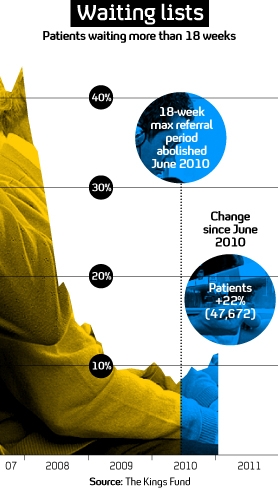The end of the NHS as we know it?
After warnings of the coming of a “perfect storm”, health expert Professor Colin Leys speak to Channel 4 News about the future of the NHS in a climate of cuts and reform.
As health charity The King’s Fund reports that NHS waiting lists are at a three year high, concerns for the future of the NHS mount, Colin Leys, Honorary Professor at Goldsmiths College London, and co-author with Stewart Player of ‘The Plot Against the NHS‘, spoke to Channel 4 News about the future of the NHS in a climate of cuts and reform.
“There’s an element of shock doctrine about this,” Professor Leys said, “you can get a lot of things done when people are disorientated by massive shock.” He said although he didn’t believe it to be intended as such, it was nevertheless “an odd process – approved and imposed on the NHS without really being challenged”. And this, he suggested, was in large part down to the ambiguity inherent in the current conversation about reform – with its connotations of efficiency savings and raising of productivity – and plain old cuts.
Professor Leys pointed out that because NHS funding is no longer pooled, there is a “very uneven spread” of resources: “Some foundation trusts in surplus and others with huge debt.” He compared the current situation with shops closing on the high street: “Cutting,” he said, “is due to breaking the NHS into various parts – the story of the last 11 years… The point of converting it into a market is that each provider is independent, but now they have put the break on, there are problems.”
Read More: Kings Fund report is "ready ammunition for service closure" - health expert Professor Allyson Pollock writes about the future of the NHS for Channel 4 News

Efficiency savings or cuts?
“Efficiency savings have never been adequately explained,” he said. He described claims that efficiency savings would eventually be “ploughed back into the system” as “interesting” but added: “No one we spoke to in the NHS believes this.”
“The King’s Fund report focuses on how finance directors see themselves making savings. It’s not to do with handling demand but actually reducing demand – basically saying, ‘sorry, we can’t treat you’.” As a result, he said, while “hospitals are being put through the ringer to shrink” private sector provision would expand.
“The unspoken part of this, in my opinion” Professor Leys continued, “the bit that doesn’t get emphasised successfully, is that resources that aren’t going to be used [within the NHS]… will be available to pay companies to take on work that can be done out of hospitals, outpatients for example.”

So, does the NHS have a future? “I don’t think any government will abolish funding for health treatment. The question is how much health funding is available in a uniform and complete way.
“The universality of the NHS whereby everyone will have access, rich or poor. That is bound to go.
“The redistributive and egalitarian system will go; since the consortia will have the power to decide what is appropriate, and will be acting within budget constraints, they will be forced to make decisions, and there will be pressure to go for cheaper providers.”
Professor Leys said the idea, presented by finance directors in The King’s Fund report, that productivity could be maintained alongside cuts, was problematic and argued that since health care is “inter-personal”, its effectiveness is lessened if there is a reduction in “the ratio of skill to patients”.
“The NHS could be more efficient than it is, that’s not rocket science, but to be more productive in business terms does not lead to quality.”
-
Latest news
-
Police try to shut down right-wing event as Nigel Farage speaks3m

-
‘Many things Netanyahu has done I disagree with, but I’m not giving up on Israel’, says top-ranking Democrat4m

-
Could US House be about to vote on Israel, Ukraine aid bill?2m

-
Number of people out of work due to long-term sickness at record high3m

-
Creating deepfake porn to be made a criminal offence after C4 investigation6m

-




